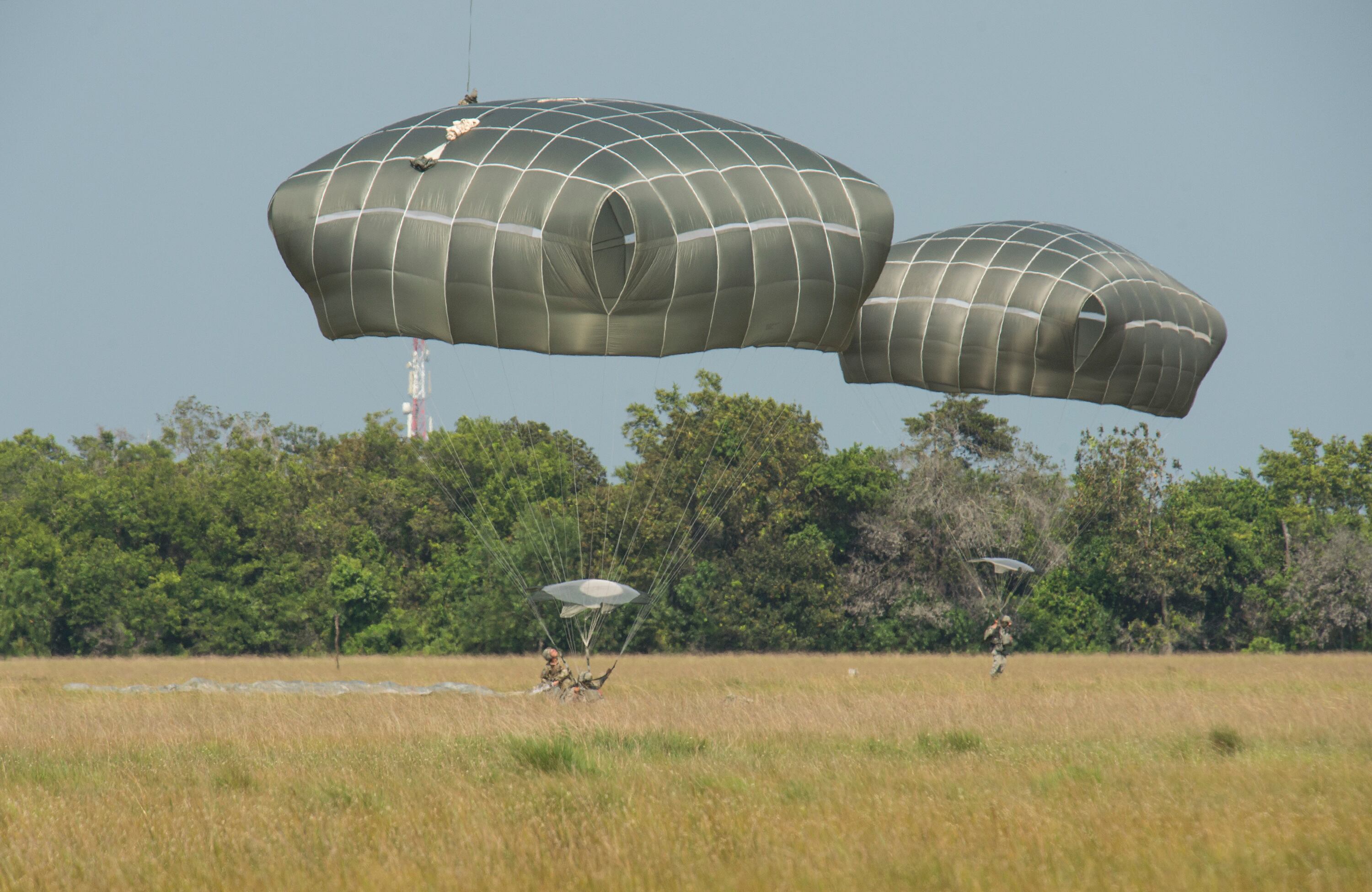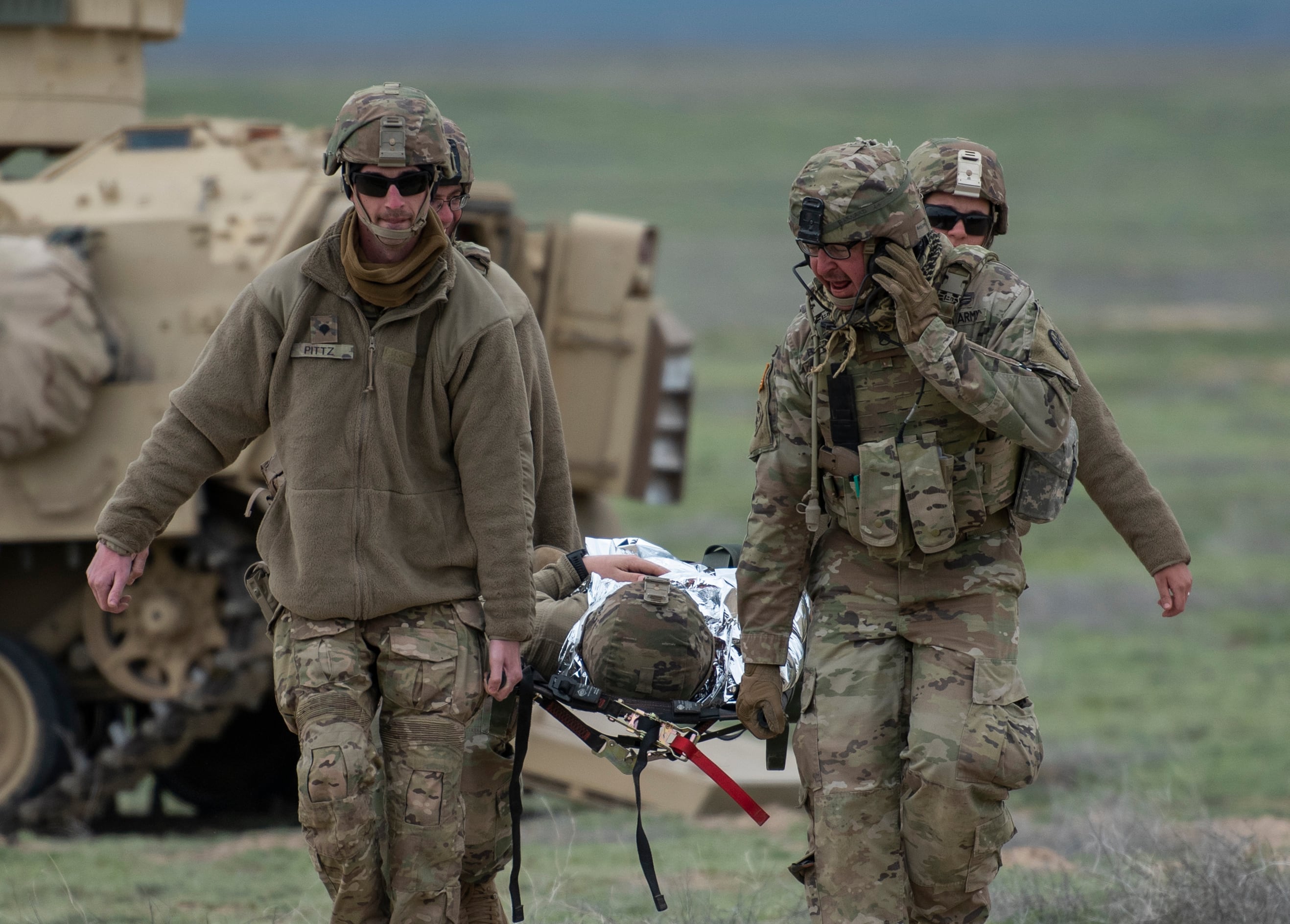POINTE DENIS, Gabon – Less than 48 hours after parachuting into Africa directly from a crosstrans-Atlantic flight from Fort Bragg, North Carolina, paratroopers from the 82nd Airborne Division took to the skies again Wednesday.
This time, they jumped alongside paratroopers from the French and Gabonese armies in the first of two international jump exchanges scheduled for this week.
"I had a Gabonese jumpmaster, beautiful views, I got to be the first jumper out over the Atlantic Ocean," said 2nd Lt. Jacqueline Roche, the assistant intelligence officer for 2nd Battalion, 325th Airborne Infantry Regiment, which is part of the 82nd Airborne's 2nd Brigade Combat Team. "Good views, good exit, everyone landed safely, you can't ask for anything more than that."
The jumps are part of Central Accord 2016, the largest, most complex exercise U.S. Army Africa has ever conducted on the African continent. In addition to the airborne operations, the exercise also includes a field-training exercise involving soldiers from 2nd Brigade Combat Team, 3rd Infantry Division, and four Central African armies, as well as a command post exercise in Libreville, Gabon's capital.
In all, almost 1,200 military personnel from 14 nations will participate in this annual event, which is part of U.S. Africa Command's Accord exercise series and a key part of the Army's effort to build partnerships across the continent.
On Wednesday, about 300 paratroopers from the three countries jumped out of U.S. Air Force C-17 and C-130 aircraft onto the sandy drop zone here at Pointe Denis. They will jump again Thursday, and the paratroopers will exchange jump wings on Friday.
"This was a great exercise for the readiness of the White Falcons," said Maj. J.M. Phillips, executive officer for 2nd Battalion, using the unit's moniker. "We were able to take combat power from Fort Bragg, North Carolina, straight into Africa, and the next thing you know, we're dropping paratroopers in a different country with that combat power ready to go."

Paratroopers, with the 82nd Airborne Division, parachute from a U.S. Air Force C-17 Globemaster during this year's Central Accord exercise in Libreville, Gabon on June 20.
Photo Credit: Tech. Sgt. Brian Kimball/DoD News
Before Wednesday's jump, paratroopers from each country spent the day learning about the other's parachutes. The Americans use the T-11, while the French and Gabonese use a parachute similar to the U.S. Army's old T-10.
"The training we conducted yesterday absolutely paid off," Phillips said.
With the French and Gabonese parachute, "the rate of descent is much faster," he said. But the Americans liked the chute, he said, saying it was smooth and easy to use. The parachute also opens more quickly than the T-11.
Capt. Brian Cook, commander of 2nd Battalion's C Company, served as the primary jumpmaster on Wednesday's jump for 28 French paratroopers. Paratroopers from Cook's company also were the ones who flew directly from Fort Bragg and jumped out into Gabon on Monday.
"This is, for most of us, our first time in Africa," Cook said. "Certainly, this is the first time we've jumped in and trained alongside host nation military forces. This is a once in a lifetime opportunity, and [his paratroopers] are absolutely loving this."
This also was Cook's first time planning such a complex, international training event.
"The best thing we can do is war-game every possible scenario and plan for any contingencies that might happen," he said. "As a leader, this is a great, challenging experience."
Jumping into austere conditions is not new for the 82nd Airborne, Cook said.
"Operating within ambiguity is absolutely what we specialize in," he said. "Having this experience, operating with a little bit of ambiguity, not knowing exactly what's going to be on the other end, and rehearsing those contingencies is absolutely what has made this mission successful."
Working with partner nations takes flexibility, Phillips said.
"You always have to add a little bit of extra time, things like language barriers, things like transportation assets, it takes a little bit longer to load the aircraft, it takes a little bit longer to rig the parachutes," he said. "Learning the Gabonese culture and how they do things has been a great experience."
Training such as the jumps into Africa and being able to project combat power across the continents is a critical capability in the 82nd Airborne Division, Phillips said.
"That's exactly what we do in the 82nd Airborne Division," he said. "We're the Army's largest proponent in the [Global Response Force]. They're ready to deploy anywhere, worldwide, in 18 hours in support of any combatant commander."
To maintain that level of readiness, paratroopers across the division are always training.
"We constantly train and exercise to stress those systems and train those systems to make sure we're ready to go," Phillips said.
The experience in Gabon has been invaluable for his paratroopers, Phillips said.
"The time the soldiers have had, these guys are making lifelong friends," he said. "For many of these troopers, this is their first time out of the United States, and this has been an eye-opening and broadening experience."
Spc. Jacob Reyes jumped with a French parachute Wednesday. The jump was "awesome," he said.
"The parachutes are a little bit smaller and different than ours, the landing's a little harder," he said.
Reyes was initially skeptical going into Wednesday's jump.
"First time jumping with a different country's parachutes instead of our own, you don't really know what the main malfunctions are, but I just went and did it, and it was fun," he said.
Reyes also got a chance to participate in the French Jungle Warfare Course, joining soldiers from the 3rd Infantry Division as the first U.S. troops to attend the school.
"It's really an experience being in a different country and seeing how they live, their culture, their way of life," Reyes said.
Roche agreed.
"I think the most important thing I've seen out here is paratroopers are paratroopers," she said, "Trust is paramount in the airborne community in general, and to see that translate across countries, that partnership is just huge."
Michelle Tan is the editor of Army Times and Air Force Times. She has covered the military for Military Times since 2005, and has embedded with U.S. troops in Iraq, Afghanistan, Kuwait, Haiti, Gabon and the Horn of Africa.




